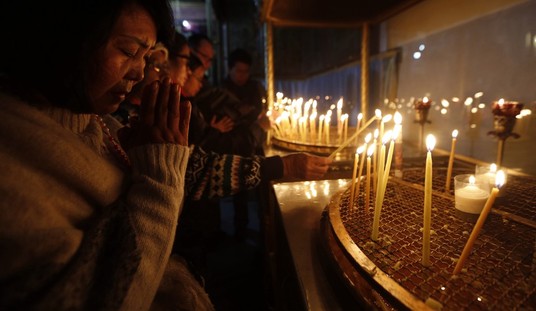If it turns out that the administration decides to intervene in Syria because President Assad’s government has used and is using chemical weapons, they would have to answer one, overriding question.
Just who should we be shooting at?
In Syria’s largest city, Aleppo, rebels aligned with Al Qaeda control the power plant, run the bakeries and head a court that applies Islamic law. Elsewhere, they have seized government oil fields, put employees back to work and now profit from the crude they produce.
Across Syria, rebel-held areas are dotted with Islamic courts staffed by lawyers and clerics, and by fighting brigades led by extremists. Even the Supreme Military Council, the umbrella rebel organization whose formation the West had hoped would sideline radical groups, is stocked with commanders who want to infuse Islamic law into a future Syrian government.
Nowhere in rebel-controlled Syria is there a secular fighting force to speak of.
This is the landscape President Obama confronts as he considers how to respond to growing evidence that Syrian officials have used chemical weapons, crossing a “red line” he had set. More than two years of violence have radicalized the armed opposition fighting the government of President Bashar al-Assad, leaving few groups that both share the political vision of the United States and have the military might to push it forward.
Among the most extreme groups is the notorious Al Nusra Front, the Qaeda-aligned force declared a terrorist organization by the United States, but other groups share aspects of its Islamist ideology in varying degrees.
“Some of the more extremist opposition is very scary from an American perspective, and that presents us with all sorts of problems,” said Ari Ratner, a fellow at the Truman National Security Project and former Middle East adviser in the Obama State Department. “We have no illusions about the prospect of engaging with the Assad regime — it must still go — but we are also very reticent to support the more hard-line rebels.”
You might recall hearing about several high profile defections of high ranking officers in the Syrian army over the last two years who invariably brought a number of soldiers with them. At the time, it was thought that these defectors would form the bulk of the Free Syrian Army, the main force fighting to remove Bashar Assad from power.
But it didn’t work out that way. Most of those units have either melted away or been absorbed by the dominant Islamist militias who are receiving arms from sympathizers in the Gulf states.
To give you an idea of just how screwed up our policies have made things, the Times article details what happened to an umnbrella military council we set up as a counterpart to the civilian opposition council:
As extremists rose in the rebel ranks, the United States sought to limit their influence, first by designating Nusra a terrorist organization, and later by pushing for the formation of the Supreme Military Council, which is linked to the exile opposition group, the Syrian National Coalition.
Although led by an army defector, Gen. Salim Idris, the council has taken in the leaders of many overtly Islamist battalions. One called the Syrian Liberation Front has been integrated nearly wholesale into the council; many of its members coordinate closely with the Syrian Islamic Front, a group that includes the extremist Ahrar al-Sham, according to a recent report by Ms. O’Bagy, of the Institute for the Study of War.
A spokesman for the council, Louay Mekdad, said that its members reflected Syrian society and that it had no ties to Nusra or other radical groups. “The character of the Syrian people is Islamic, but it is stupid to think that Syria will turn into Afghanistan,” he said. “That’s just an excuse for those who don’t want to help Syria.”
In effect, the US helped facilitate the concentration of Islamist power in the military.
Blunders aside, there is still a question of intervention. Despite fairly conclusive proof that sarin gas has been employed by the Syrian army, President Obama — quite rightly — is still reluctant to react militarily. Do we really want to provide air support for al-Qaeda backed fighters? Or establish a “no-fly” zone to assist those who, once in power, would become our enemy?
A cynical policy would see to it that the civil war went on and on, so that the Islamists would be denied victory and Assad would be too pre-occupied to cause trouble elsewhere, like Iraq. But with millions of civilians threatened with starvation and thousands dying every month, such a policy would be unworthy of the United States. We must find a way with our allies to end this conflict and then try and pick up the pieces as best we can after Assad has been deposed.










Join the conversation as a VIP Member